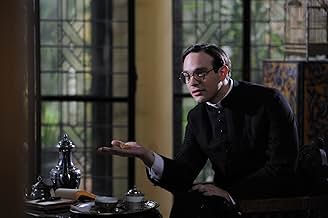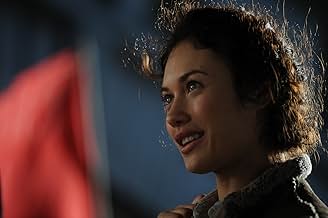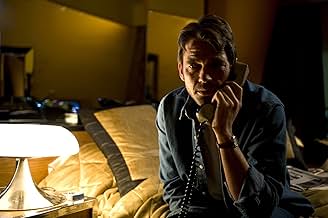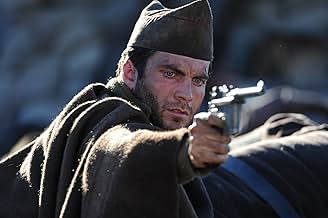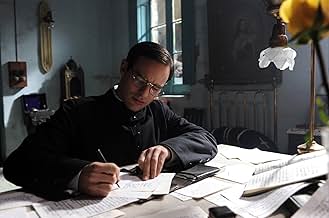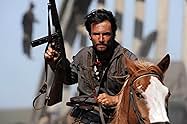CALIFICACIÓN DE IMDb
5.7/10
5.2 k
TU CALIFICACIÓN
A raíz del horror de la Guerra Civil española, un candidato a la canonización es investigado por un periodista que descubre que su propio padre tenía una conexión profunda, oscura y devastad... Leer todoA raíz del horror de la Guerra Civil española, un candidato a la canonización es investigado por un periodista que descubre que su propio padre tenía una conexión profunda, oscura y devastadora con la vida del santo.A raíz del horror de la Guerra Civil española, un candidato a la canonización es investigado por un periodista que descubre que su propio padre tenía una conexión profunda, oscura y devastadora con la vida del santo.
- Dirección
- Guionista
- Elenco
- Premios
- 2 nominaciones en total
Jordi Mollà
- Don José
- (as Jordi Mollá)
Juan Cruz Rolla Knight
- Young Josemaría
- (as Juan Cruz)
- Dirección
- Guionista
- Todo el elenco y el equipo
- Producción, taquilla y más en IMDbPro
Opiniones destacadas
The problem with this film at IMDb is to know the real and final score. Right now is eight (8). 119 users of 147 voted ten (10), 14 voted nine (9), 6 voted eight (8). The others users voted lower than six (6). Well, or this is a spectacular film or we have a problem here. This score seems to me a little unreal and unbelievably.
Knowing Opus Dei since 1980, I think these 119 users are probably Opus Dei voters only and want to keep the score so higher as possible.
Why does this matter? Because a score should be representative and product of neutral or spontaneous voting. Well, I can barely believe this is the case. Let's see what happen in the next months.
And what about the film? Well, if somebody wants to know about Escriva and his Opus Dei, this film does not tell too much.
This is a very light film without any real information and questions like: How Opus Dei as organization was actually built since 1928? Why Opus Dei is in a very deep internal crisis since ten or fifteen years ago? Why a lot of people are leaving Opus Dei in the last years (in Spain, Mexico, Argentina, etc.)? Why is not so easy to leave Opus Dei? Yes, it is not easy but a lot of people fight for. Is it true that Escrivá declared whoever leaves Opus Dei will suffer a lot in this life and his eternal salvation will be in danger? Why so many celibate members suffer from depression? Is it possible that Opus Dei psychiatrists do not keep the professional secrecy and inform to Opus Dei superiors if a member talks about leaving Opus Dei? Yeah, that is a tough question to be made. How is possible that Escrivá became saint mainly because the testimony of his confessor? Why celibate members have to make a will (pro Opus Dei) like monks do before the perpetual incorporation? Why celibate members have to give their salary away like some monks do? Why lay members have to request a pardon of departure (dispense) to leave Opus Dei (like monks do) only need in the case of sacred vows? Is that because without knowing they really are bounded by some kind of sacred vows? Why lay persons have obligations - without knowing and without consent- that the Code of Canon Law established only for a consecrated life? Is there any kind of deception in all of this?
After these questions, you know a serious film about Opus Dei and Escrivá is waiting to be made.
I am not going to vote. I rather write this brief review.
Knowing Opus Dei since 1980, I think these 119 users are probably Opus Dei voters only and want to keep the score so higher as possible.
Why does this matter? Because a score should be representative and product of neutral or spontaneous voting. Well, I can barely believe this is the case. Let's see what happen in the next months.
And what about the film? Well, if somebody wants to know about Escriva and his Opus Dei, this film does not tell too much.
This is a very light film without any real information and questions like: How Opus Dei as organization was actually built since 1928? Why Opus Dei is in a very deep internal crisis since ten or fifteen years ago? Why a lot of people are leaving Opus Dei in the last years (in Spain, Mexico, Argentina, etc.)? Why is not so easy to leave Opus Dei? Yes, it is not easy but a lot of people fight for. Is it true that Escrivá declared whoever leaves Opus Dei will suffer a lot in this life and his eternal salvation will be in danger? Why so many celibate members suffer from depression? Is it possible that Opus Dei psychiatrists do not keep the professional secrecy and inform to Opus Dei superiors if a member talks about leaving Opus Dei? Yeah, that is a tough question to be made. How is possible that Escrivá became saint mainly because the testimony of his confessor? Why celibate members have to make a will (pro Opus Dei) like monks do before the perpetual incorporation? Why celibate members have to give their salary away like some monks do? Why lay members have to request a pardon of departure (dispense) to leave Opus Dei (like monks do) only need in the case of sacred vows? Is that because without knowing they really are bounded by some kind of sacred vows? Why lay persons have obligations - without knowing and without consent- that the Code of Canon Law established only for a consecrated life? Is there any kind of deception in all of this?
After these questions, you know a serious film about Opus Dei and Escrivá is waiting to be made.
I am not going to vote. I rather write this brief review.
I have just been invited to watch the movie during a screening presentation in Rome and after several hours I'm still deeply touched. It's a film that makes you think, reflect. It's not an easy action movie, and in that sense, some maybe would get disappointed if they are thinking of it as another war movie. It's a drama that despite the cruel events that portraits opens your heart to hope and puts you on the quest for transcendence. As "The Mission", this new Joffe's film, uses the "paralel" life of two friends to show how difficult it is to make a fair decision while you are under stressful circumstances. Some people may judge this film as the Opus Dei answer to the Da Vinci Code attacks, and in a certain sense it is, but the film is not a propaganda movie, but a deep meditation from an agnostic point of view of the sense of life.
I found this film so pretentious in its aspiration and claims, so boring badly-acted and obviously propagandist in its execution to compel me to write my first review. (When I woke up after the big ZZzzz, I mean...) What it does is to paint a glorified history of the "Saint" and the birth of the Opus Dei, in pure ecclesiastic style, never mind historic accuracy.
It would still be all OK to me if the film had any cinematographic merits, if the acting was good, if dialogue was credible But it really isn't (e.g., "I wasn't allowed to play with Jose Maria anymore, my father thought poverty was contagious... My dad had more money, ... but Jose Maria had more dad." Excuse me! And also: "Like or not, most young men were celibate, at least as a priest you got paid for it". What? Excuse me!)
So, my advice is: really don't waste your two hours trying to stay awake during this: if you're interested in the Opus Dei and Escriva De Balaguer, find a more serious and reliable source, if you only want to go the movies, find a better film. This one should stay in the religious circles were it belongs, not in theatres.
It would still be all OK to me if the film had any cinematographic merits, if the acting was good, if dialogue was credible But it really isn't (e.g., "I wasn't allowed to play with Jose Maria anymore, my father thought poverty was contagious... My dad had more money, ... but Jose Maria had more dad." Excuse me! And also: "Like or not, most young men were celibate, at least as a priest you got paid for it". What? Excuse me!)
So, my advice is: really don't waste your two hours trying to stay awake during this: if you're interested in the Opus Dei and Escriva De Balaguer, find a more serious and reliable source, if you only want to go the movies, find a better film. This one should stay in the religious circles were it belongs, not in theatres.
A decent sketch. About war, friendship, courage and compromises, about faith, jealousy and parenthood. Decent, interesting for actors more than for story, obvious answer of Opus Dei against propaganda created by Da Vinci Code, it is a beautiful sketch of tragic events.
Roland Joffé did not disappoint me with this film. I am a first generation spaniard and I find Joffé's portrayal of the Civil War honest and fair. The story is not engulfed by facts of history, it takes great care in exploring the mysteries of the characters' backgrounds.
On one side we have the historical figure of Jose Maria Escribar, tormented in his search for God and holding firmly to his ideals while submerged in a world of hatred and chaos. On the other Manolo, haunted by vengeance and confusion; fighting without a cause and desperately searching for something he can believe him, an answer to his inner chaos. Finally, Roberto, son of Manolo, must slowly unveil the terrible secrets his father has hidden within him and come to terms with finding out who the man that brought him up was.
The film explores the senseless nature of war and its consequences, the spiral of hatred that slowly engulfs men, the repentance for terrible mistakes and the struggle to forgive them. Each character follows a path filled with dilemmas and suffering at the end of which they must fight themselves and their dragons.
Technicalwise, the film is faultless. There is great care in every scene and as I can testify Joffé has done his homework. The detail to which the history and scenery of 1937 Spain has been recreated is astounding. Even so, the story talks about people, about soldiers; never about leaders or politicians. The film captures the essence of human conflict in its most raw form.
Do not expect an action packed war film. For those who have interest in the roots of Opus Dei, this film will not help you there. It deals with the repercussions of war and strife in people, it does not deal with the grander scale of things.
If nothing else this film will reassure you that war is and always will be a futile tragedy, all victories are Pyrrhic and the aftermath leaves bitter resentment and pain. An interesting perspective in this film is that of the many bystanders who are forced to choose the side they support and so they must be separated from loved ones forever. When a few want war, the rest have no say. As long as the hatred of so few is not buried, war will rise once more.
There Be Dragons is a deeply personal and spiritual film. It is very intense and reflects unapologetically the worst side of humanity. It is true to the title, where this film takes you, there be dragons.
On one side we have the historical figure of Jose Maria Escribar, tormented in his search for God and holding firmly to his ideals while submerged in a world of hatred and chaos. On the other Manolo, haunted by vengeance and confusion; fighting without a cause and desperately searching for something he can believe him, an answer to his inner chaos. Finally, Roberto, son of Manolo, must slowly unveil the terrible secrets his father has hidden within him and come to terms with finding out who the man that brought him up was.
The film explores the senseless nature of war and its consequences, the spiral of hatred that slowly engulfs men, the repentance for terrible mistakes and the struggle to forgive them. Each character follows a path filled with dilemmas and suffering at the end of which they must fight themselves and their dragons.
Technicalwise, the film is faultless. There is great care in every scene and as I can testify Joffé has done his homework. The detail to which the history and scenery of 1937 Spain has been recreated is astounding. Even so, the story talks about people, about soldiers; never about leaders or politicians. The film captures the essence of human conflict in its most raw form.
Do not expect an action packed war film. For those who have interest in the roots of Opus Dei, this film will not help you there. It deals with the repercussions of war and strife in people, it does not deal with the grander scale of things.
If nothing else this film will reassure you that war is and always will be a futile tragedy, all victories are Pyrrhic and the aftermath leaves bitter resentment and pain. An interesting perspective in this film is that of the many bystanders who are forced to choose the side they support and so they must be separated from loved ones forever. When a few want war, the rest have no say. As long as the hatred of so few is not buried, war will rise once more.
There Be Dragons is a deeply personal and spiritual film. It is very intense and reflects unapologetically the worst side of humanity. It is true to the title, where this film takes you, there be dragons.
¿Sabías que…?
- TriviaThe title comes from the phrase "here be dragons" which was written on old maps to denote dangerous or uncharted areas.
- ErroresThe sub machine gun that the rebel leader Oriol takes from the wrecked combat car to pose with Ildiko is a Thompson M1 or M1-A1, as shown by the charging handle on the right and the simplified rear sight. This was not introduced until 1942, six years after the events in the movie.
- Versiones alternativasBecause of poor box-office performance in 2011, the film was re-edited and re-released in the USA in 2012, under the title "There Be Dragons: Secrets of Passion". This new version is shorter (106 minutes) and has a new music scored by Robert Folk.
- ConexionesFeatured in Saint of the Ordinary: The Making of There Be Dragons (2011)
Selecciones populares
Inicia sesión para calificar y agrega a la lista de videos para obtener recomendaciones personalizadas
- How long is There Be Dragons?Con tecnología de Alexa
Detalles
- Fecha de lanzamiento
- Países de origen
- Sitios oficiales
- Idioma
- También se conoce como
- There Be Dragons
- Locaciones de filmación
- Productoras
- Ver más créditos de la compañía en IMDbPro
Taquilla
- Presupuesto
- USD 36,000,000 (estimado)
- Total en EE. UU. y Canadá
- USD 1,069,334
- Fin de semana de estreno en EE. UU. y Canadá
- USD 705,537
- 8 may 2011
- Total a nivel mundial
- USD 4,372,642
- Tiempo de ejecución2 horas 2 minutos
- Color
- Mezcla de sonido
- Relación de aspecto
- 2.35 : 1
Contribuir a esta página
Sugiere una edición o agrega el contenido que falta

Principales brechas de datos
What is the German language plot outline for Secretos de pasión (2011)?
Responda







